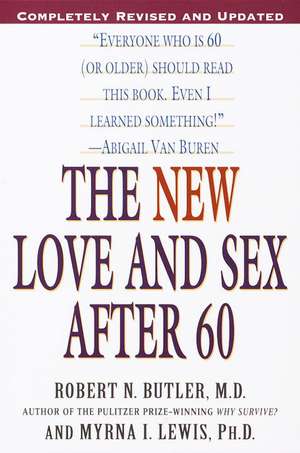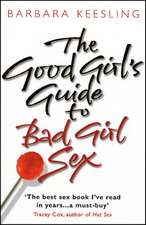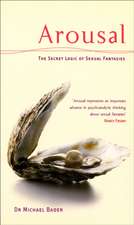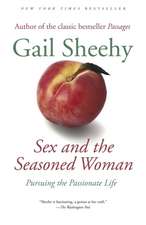The New Love and Sex After 60
Autor Robert N. Butler, Myrna I. Lewisen Limba Engleză Paperback – 31 dec 2001
You may be getting older but love and sex are still a vital part of your life. Here is the book that speaks to your concerns about sex beyond the middle years. Two leading experts have completely updated and revised the classic guide on the subject to address the needs of our changing world in the new millennium. Inside you'll find:
- The truth about aging and how it affects sexual desire and lovemaking
- A thorough guide to common medical problems--and solutions
- New drugs that can improve and enhance sexuality--including the latest on Viagra
- Research on post-menopausal changes
- A detailed look at the procedures for easing and solving sexual problems
- Practical strategies for finding new relationships and staying sexually fit
- Advice to help your adult children understand your new relationships
Preț: 126.88 lei
Nou
Puncte Express: 190
Preț estimativ în valută:
24.28€ • 25.41$ • 20.21£
24.28€ • 25.41$ • 20.21£
Carte disponibilă
Livrare economică 10-24 martie
Preluare comenzi: 021 569.72.76
Specificații
ISBN-13: 9780345442116
ISBN-10: 0345442113
Pagini: 400
Dimensiuni: 140 x 208 x 23 mm
Greutate: 0.45 kg
Ediția:Revised, Update
Editura: BALLANTINE BOOKS
ISBN-10: 0345442113
Pagini: 400
Dimensiuni: 140 x 208 x 23 mm
Greutate: 0.45 kg
Ediția:Revised, Update
Editura: BALLANTINE BOOKS
Recenzii
"Marvelous . . . [This book] helps women and men . . . attain what the authors brilliantly delineate as the second language of sex."
--BETTY FRIEDAN
"Everyone who is 60 (or older) should read this book. Even I learned something!"
--ABIGAIL VAN BUREN
--BETTY FRIEDAN
"Everyone who is 60 (or older) should read this book. Even I learned something!"
--ABIGAIL VAN BUREN
Extras
The best authorities on whether love and sex can exist in later life are older people themselves. Frank and Marianne have been together forty-six years. They've led unremarkable lives in terms of success and lucky breaks and have had more than their share of tragedies. Yet in their late seventies they are enthusiastic, optimistic, and in love. Frank says of Marianne, "I love this woman more each day." Marianne replies, "I couldn't have asked for a better partner--he's kind, sweet, funny . . . he is everything a woman could want." Both are quick to add that it is their relationship that has been the core of their sense of satisfaction in life--and their sexual closeness is an indispensable part of their affection for each other. These two are not alone in their point of view. Any of us who has worked professionally with older people (or is older himself) could cite scores of examples of similar attitudes among older men and women, married or single.
Sound research data beyond the clinical observa-tions of those working
with older people is another story. The United States lacks a truly
comprehensive national survey of sexuality that encompasses the older
population. The available information includes the important but now
outdated and limited Kinsey studies (first published in 1948), the
physiologic investigations of Masters and Johnson, and the findings of
both the Duke Longitudinal Studies and the Baltimore Longitudinal Study
on Aging. Questionnaire surveys of self-reported sexual activity among
older people have been conducted by mail (for example, by Consumers
Union), but these provide information only on those who volunteer. Other
studies have age cutoffs for their subjects, usually at sixty or
seventy. The outcome is that facts and figures on the nature and
frequency of sexual activity among older persons, including its
association with marital and health status or any other variable in
people's lives, are unknown.
One thing is certain, however. Our society is in the midst of an immense
demographic change. Every day over six thousand Americans turn sixty.
Altogether, forty-five million people or one out of every six of us are
sixty or older. By the year 2006 baby boomers will begin to dramatically
expand the ranks of the older population as they themselves start
turning sixty. In about twenty five years, one in five Americans,
including the boomers, will be over sixty-five--a historically
unprecedented 20 percent of the population.
The definition of old age is changing. In June 2000, The New Yorker
Magazine ran a cartoon showing a woman announcing to her husband,
"Good news, honey-- seventy is the new fifty." That same year a Harris
Poll found that only 14 percent of respondents believed chronological
age was the best marker of old age. Instead, 41 percent cited a "decline
in physical ability"--a highly variable event--as the best evidence of
the beginning of old age. According to this definition, people in good
health are younger longer, whereas anyone who gets sick becomes older
sooner. As for disability itself, studies show that there have been
significant declines in disability rates since 1982. Heart disease and
stroke alone have been reduced 60 percent since 1950.
In light of all this, what can we safely say about sexuality in later
life? Our views on this topic have not yet caught up with the slowly
changing character of aging. Many people--not only the young and
middle-aged but older people themselves--are quite uniformly negative
about the prospects of continued sexual interest and ability. Many
simply assume that the game is over somewhere in late midlife or early
later life. They couldn't be more wrong. In spite of the scarcity of
nationwide data, we turn to our own clinical and research work and the
work of other gerontologists and researchers to demon-B strate that
relatively healthy older people who enjoy sex are capable of
experiencing it--often until very late in life. Frequently those who do
have sexual problems can be helped.
We have written this book for those older men and women who are
presently or potentially interested in sexuality and would like to know
more about what is likely to happen to their sexuality over time.We will
offer solutions to sexual problems that may occur, and propose ways of
countering the negative attitudes that older people may
experience--within themselves, from family members, from the medical and
psychotherapeutic professions, and from society at large. We especially
want older people to know that their concerns and problems are not
unique, that they are not alone in their experience, and that many
others feel exactly as they do.Even those people who have had a lively
enthusiasm and capacity for sex all their lives often need information,
support, and sometimes various kinds of treatment in order to continue
engaging in sexual activity as the years go by. In addition, people for
whom sex may not have been especially satisfying in their younger days
may find that it is now possible to improve the quality of the
experience despite their long-standing difficulties.
Sex and sexuality are pleasurable, rewarding, and fulfilling experiences
that can enhance the middle and later years. But they are also--as
everyone knows-- enormously complex psychologically. Every one of us
carries with us throughout our lives a weight of attitudes related to
sexuality that have been shaped by our genes, our parents, our families,
our teachers, and our society, some of which are positive and some
negative, some of which we realize and many of which we are unaware.
Because of this, it is useful to understand what underlies so many of
the attitudes and problems about sex that one encounters. If you are an
older person, be prepared for the likelihood of conflicting feelings
within yourself and contradictory attitudes from the outside world.
Should older people have sex lives? Are they even able to make love? Do
they really want to? Is it appropriate--that is, "normal" or
"decent"--or is sexual interest a sign of "senility" and brain disease
(he/she has gone "daft"), poor judgment, or an embarrassing inability to
adjust to aging with the proper restraint and resignation?
How much less troubling it would be to accept the folklore of
cookie-baking grandmothers who bustle around the kitchen making goodies
for their loved ones while rocking-chair grandfathers puff on their
pipes and reminisce. Idealized folk figures like these are not supposed
to have sex lives of their own. After all, they represent the parents
and grandparents we all remember from our childhood, rather than fellow
adults with the same needs and desires that we have.
As an older man or woman, you may find that love and sex in later life,
when they are acknowledged at all, will be patronizingly thought of as
"cute" or "sweet," like the puppy love of teenagers; but even more
likely, they will be ridiculed, a subject for jokes that have
undercurrents of disdain and apprehensiveness at the prospect of growing
older. Our language is full of telltale phrases: older men become "dirty
old men," "old fools," or "old goats" where sex is involved. Older women
are depicted as uniformly sexless or sexually unattractive. Most of this
"humor" implies the impotence of older men and the ugliness of older
women.
A mythology fed by misinformation surrounds late-life sexuality. The
presumption is that sexual desire automatically ebbs with age--that it
begins to decline when you are in your forties or even earlier, proceeds
relentlessly downward (you are "losing it"), and eventually hits bottom
(you are "over the hill") at some time between sixty and sixty-five.
Thus an older woman who shows an evident, perhaps even a lusty, interest
in sex is often assumed to be suffering from "emotional" problems; and
if she is obviously in her right mind and sexually active, she runs the
risk of being called "oversexed" or, more kindly, said to be clinging
pathetically to her lost youth.
Sound research data beyond the clinical observa-tions of those working
with older people is another story. The United States lacks a truly
comprehensive national survey of sexuality that encompasses the older
population. The available information includes the important but now
outdated and limited Kinsey studies (first published in 1948), the
physiologic investigations of Masters and Johnson, and the findings of
both the Duke Longitudinal Studies and the Baltimore Longitudinal Study
on Aging. Questionnaire surveys of self-reported sexual activity among
older people have been conducted by mail (for example, by Consumers
Union), but these provide information only on those who volunteer. Other
studies have age cutoffs for their subjects, usually at sixty or
seventy. The outcome is that facts and figures on the nature and
frequency of sexual activity among older persons, including its
association with marital and health status or any other variable in
people's lives, are unknown.
One thing is certain, however. Our society is in the midst of an immense
demographic change. Every day over six thousand Americans turn sixty.
Altogether, forty-five million people or one out of every six of us are
sixty or older. By the year 2006 baby boomers will begin to dramatically
expand the ranks of the older population as they themselves start
turning sixty. In about twenty five years, one in five Americans,
including the boomers, will be over sixty-five--a historically
unprecedented 20 percent of the population.
The definition of old age is changing. In June 2000, The New Yorker
Magazine ran a cartoon showing a woman announcing to her husband,
"Good news, honey-- seventy is the new fifty." That same year a Harris
Poll found that only 14 percent of respondents believed chronological
age was the best marker of old age. Instead, 41 percent cited a "decline
in physical ability"--a highly variable event--as the best evidence of
the beginning of old age. According to this definition, people in good
health are younger longer, whereas anyone who gets sick becomes older
sooner. As for disability itself, studies show that there have been
significant declines in disability rates since 1982. Heart disease and
stroke alone have been reduced 60 percent since 1950.
In light of all this, what can we safely say about sexuality in later
life? Our views on this topic have not yet caught up with the slowly
changing character of aging. Many people--not only the young and
middle-aged but older people themselves--are quite uniformly negative
about the prospects of continued sexual interest and ability. Many
simply assume that the game is over somewhere in late midlife or early
later life. They couldn't be more wrong. In spite of the scarcity of
nationwide data, we turn to our own clinical and research work and the
work of other gerontologists and researchers to demon-B strate that
relatively healthy older people who enjoy sex are capable of
experiencing it--often until very late in life. Frequently those who do
have sexual problems can be helped.
We have written this book for those older men and women who are
presently or potentially interested in sexuality and would like to know
more about what is likely to happen to their sexuality over time.We will
offer solutions to sexual problems that may occur, and propose ways of
countering the negative attitudes that older people may
experience--within themselves, from family members, from the medical and
psychotherapeutic professions, and from society at large. We especially
want older people to know that their concerns and problems are not
unique, that they are not alone in their experience, and that many
others feel exactly as they do.Even those people who have had a lively
enthusiasm and capacity for sex all their lives often need information,
support, and sometimes various kinds of treatment in order to continue
engaging in sexual activity as the years go by. In addition, people for
whom sex may not have been especially satisfying in their younger days
may find that it is now possible to improve the quality of the
experience despite their long-standing difficulties.
Sex and sexuality are pleasurable, rewarding, and fulfilling experiences
that can enhance the middle and later years. But they are also--as
everyone knows-- enormously complex psychologically. Every one of us
carries with us throughout our lives a weight of attitudes related to
sexuality that have been shaped by our genes, our parents, our families,
our teachers, and our society, some of which are positive and some
negative, some of which we realize and many of which we are unaware.
Because of this, it is useful to understand what underlies so many of
the attitudes and problems about sex that one encounters. If you are an
older person, be prepared for the likelihood of conflicting feelings
within yourself and contradictory attitudes from the outside world.
Should older people have sex lives? Are they even able to make love? Do
they really want to? Is it appropriate--that is, "normal" or
"decent"--or is sexual interest a sign of "senility" and brain disease
(he/she has gone "daft"), poor judgment, or an embarrassing inability to
adjust to aging with the proper restraint and resignation?
How much less troubling it would be to accept the folklore of
cookie-baking grandmothers who bustle around the kitchen making goodies
for their loved ones while rocking-chair grandfathers puff on their
pipes and reminisce. Idealized folk figures like these are not supposed
to have sex lives of their own. After all, they represent the parents
and grandparents we all remember from our childhood, rather than fellow
adults with the same needs and desires that we have.
As an older man or woman, you may find that love and sex in later life,
when they are acknowledged at all, will be patronizingly thought of as
"cute" or "sweet," like the puppy love of teenagers; but even more
likely, they will be ridiculed, a subject for jokes that have
undercurrents of disdain and apprehensiveness at the prospect of growing
older. Our language is full of telltale phrases: older men become "dirty
old men," "old fools," or "old goats" where sex is involved. Older women
are depicted as uniformly sexless or sexually unattractive. Most of this
"humor" implies the impotence of older men and the ugliness of older
women.
A mythology fed by misinformation surrounds late-life sexuality. The
presumption is that sexual desire automatically ebbs with age--that it
begins to decline when you are in your forties or even earlier, proceeds
relentlessly downward (you are "losing it"), and eventually hits bottom
(you are "over the hill") at some time between sixty and sixty-five.
Thus an older woman who shows an evident, perhaps even a lusty, interest
in sex is often assumed to be suffering from "emotional" problems; and
if she is obviously in her right mind and sexually active, she runs the
risk of being called "oversexed" or, more kindly, said to be clinging
pathetically to her lost youth.













